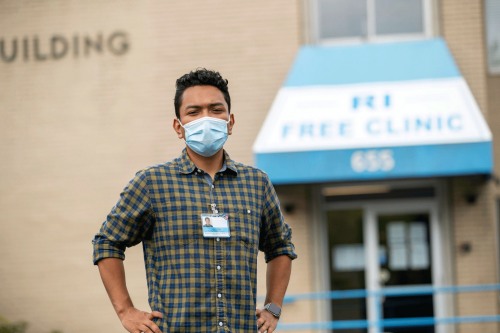Since May, a Brown senior and other students have played an instrumental role in providing COVID-19 tests to low-income, uninsured Rhode Island residents, many of whom are working on the front lines amid a global pandemic.
Video by Stephen Crocker/Brown University
PROVIDENCE, R.I. [Brown University] - In March 2020, Cesar Orduña was one of many students across the nation whose future suddenly became less certain as the spread of novel coronavirus ushered much of the U.S. into social isolation.
On campus at Brown, where Orduña is biology concentrator, many operations went remote, temporarily halting plans he was co-leading to establish a Brown-RISD Catholic center on College Hill, pausing his in-person student mentorship efforts, and potentially unsettling his plans to graduate and process through the Van Wickle Gates in December 2020.
Then in May, amid the chaos and uncertainty, the senior and aspiring doctor found a new purpose: administering free COVID-19 tests to Rhode Island's uninsured and underserved.
"Over finals period, I got a text message from a friend who had been a longtime volunteer at the Rhode Island Free Clinic," Orduña said. "She told me they were looking for someone to coordinate a COVID testing site. I reached out to the practice manager at the clinic, Luz Rodrigues, and we had a couple of conversations - the next week, I was at the clinic and helping out with the testing site."
Over the last three months, Orduña has spent five full days a week serving as coordinator for the clinic's COVID-19 test site, located in a parking lot beside the clinic building on the south side of Providence. The site opened in May to deliver urgently needed tests and care to vulnerable Rhode Islanders who are uninsured and have no primary care provider, according to Marie Ghazal, chief executive officer. Like the clinic itself, the test site relies entirely on philanthropy and volunteers; more than 700 community members help out every year.
On a typical workday, Orduña arrives 3 hours before the site opens, preparing medical supplies and personal protective equipment for his colleagues, organizing patients' paperwork, arranging the test kits and briefing test site volunteers on the day ahead. He oversees testing for about 50 uninsured patients a day, many of whom work on the front lines as custodians and grocery store baggers, come from Central American and Caribbean countries, live in multigenerational houses and earn low wages. And at the end of the day, he reviews the patient paperwork and ensures test samples are sent to a nearby lab.
So far, Orduña and his team have successfully tested more than 1,300 uninsured, low-income individuals from the Providence area.
"I've always wanted to help the underserved - people without insurance, people who speak Spanish," Orduña said. "Working at the clinic and seeing how much these communities have been impacted by the virus, seeing those inequalities and disparities, has only reinforced my belief that this is important work."
Clinic leaders said they have been impressed by Orduña's work.
"Under Cesar's leadership, the clinic has increased access through our COVID-19 hotline, timely appointments, tests and results, and vital education, all delivered in a professional and culturally attuned manner," Ghazal said.
The volunteer service Brown students provide has a direct and important impact on the lives of people who need access to medical care.
Driven to serve
Orduña isn't new to clinic volunteering. He came to the Rhode Island Free Clinic with two years of experience volunteering at Providence's Clínica Esperanza, which also serves the uninsured, particularly those who live in Spanish-speaking households. He did a little bit of everything there, from patient paperwork intake to front desk work.
Orduña said he's driven to serve uninsured immigrant populations because he was once in their shoes. When he was an adolescent, he and his family moved from a small mountain town in Central Mexico to Lake Placid, Florida, to pursue new opportunities. Orduña remembers temporarily living without health insurance and struggling to navigate life in a new country where the language, culture and food was unfamiliar.
He's just one of many Brown students who have seized on the opportunity to assist the most vulnerable populations in the midst of the global pandemic. According to Marvin Ronning, the clinic's director of strategic partnerships and grants, a small corps of Brown undergraduates has provided administrative and logistical support since May, serving as Spanish language interpreters, scheduling test appointments, manning phone lines and supporting efforts to provide follow-up care to patients who test positive for COVID-19.
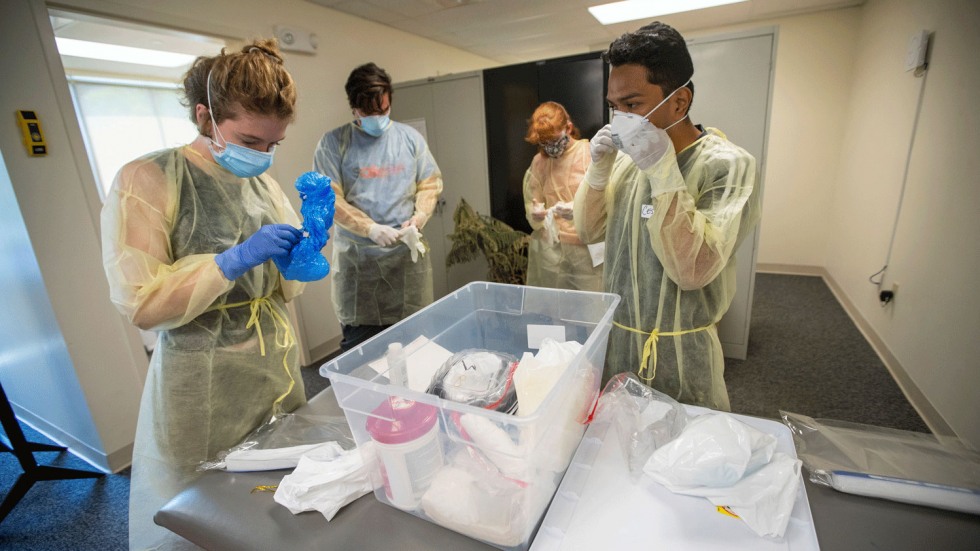
Orduña and volunteers don personal protective equipment together before the testing site opens.
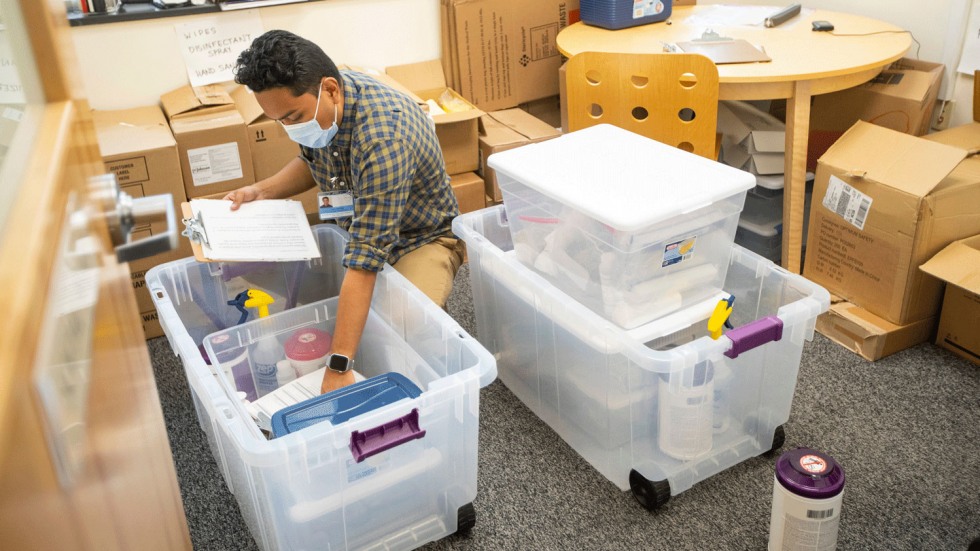
Before volunteers arrive, Orduña organizes patient paperwork and materials needed for testing and sanitizing.
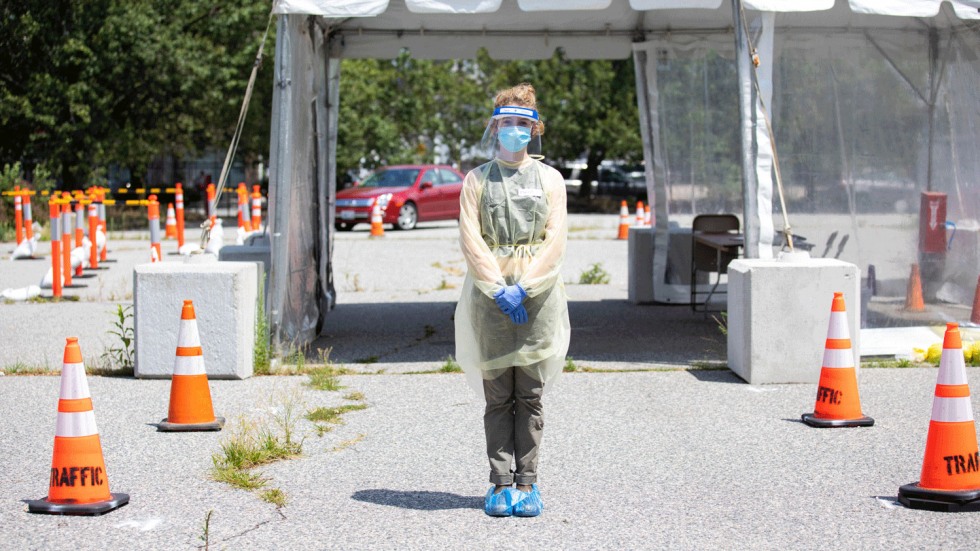
Elvira Fleury, a junior at Brown, is one of several students who works at the Rhode Island Free Clinic's COVID-19 testing site.
"Many of the students who volunteer here have life experiences that resonate with the clinic's mission to provide high-quality care to people who deserve it but otherwise wouldn't have access to it, because they have lived experiences similar to those of our patients," Ronning said. "Many others are simply deeply committed to social justice and equal access to quality care."
Some of the testing site's student volunteers hope to become medical professionals, like Orduña. Others are concentrating in history, linguistics and engineering and simply wanted to help vulnerable populations hit hard by the pandemic.
Sammy Plezia, a rising junior, started volunteering at the clinic as part of a Spring 2020 Hispanic studies course, "The Latin American Diaspora in the U.S.," which called on students to supplement their coursework by engaging with a local organization that serves Spanish-speaking residents.
"I had such a positive experience at the clinic during the course that I knew I wanted to continue volunteering afterward," said Plezia, who hopes to become a clinical psychologist. "In the winter and spring, I worked as a nutrition interpreter, and I began work as a COVID phone line volunteer this summer after seeing the need. Ultimately, I am grateful that I get to continuously learn at the clinic and be surrounded by motivating staff and volunteers who are constantly working to ensure that everyone has access to culturally responsive health care."
Ronning said both graduate and undergraduate students have played important roles at the clinic throughout its 20-year history. He estimated that in 2020, at least 50 students from Brown have participated in clinic operations as volunteers, interns, apprentices and research fellows. A handful of master's students in the School of Public Health work as researchers for the clinic, investigating the clinic's community impact, conducting patient surveys and more. Students at the Warren Alpert Medical School provide care to patients under the supervision of Dr. Caroline Troise, the clinic's volunteer medical director and a clinical assistant professor at Brown. David Bonilla, a rising junior and Bonner Community Fellow, has for three years led efforts to expand the corps of volunteers who serve as Spanish language interpreters. And since 2018, four undergraduate interns have collectively contributed 1,400 volunteer hours to tasks such as medical transcription and patient check-ins.
Working at the clinic and seeing how [underserved] communities have been impacted by the virus, seeing those inequalities and disparities, has only reinforced my belief that this is important work.
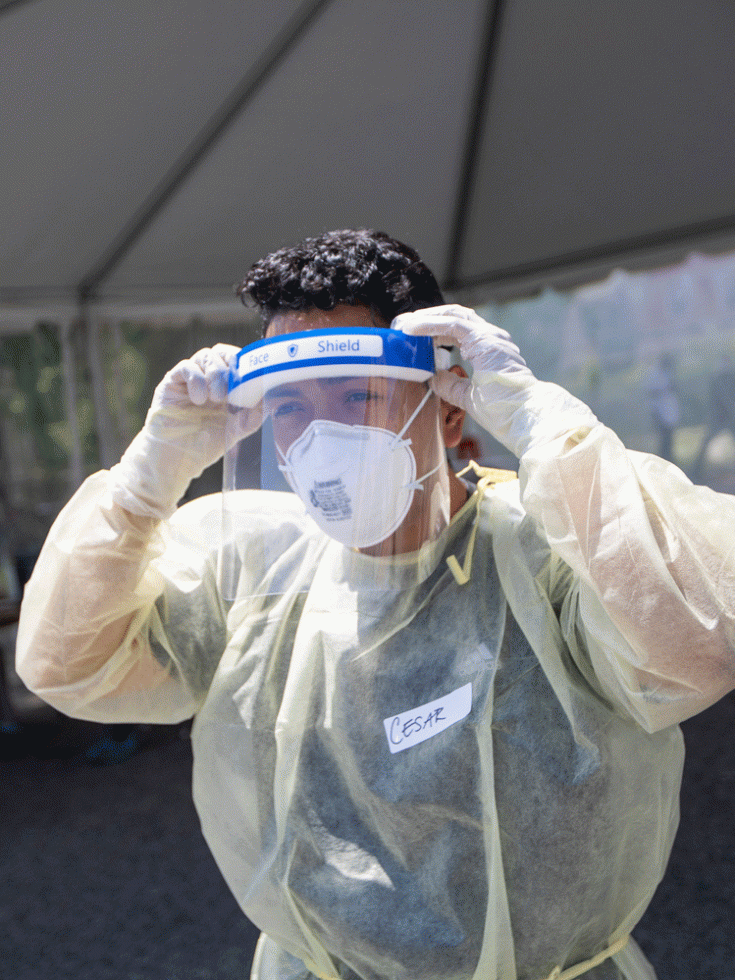
"The volunteer service Brown students provide has a direct and important impact on the lives of people who need access to medical care," Ronning said. "Cesar's work here has been tremendous, because he is helping marshal other volunteers to provide testing for the low-income, uninsured adults who have been disproportionately impacted by COVID-19."
From the clinic to College Hill, Orduña is committed to giving people the help he was grateful to receive earlier in life. He spent two semesters as a teaching assistant in "The Foundation of Living Systems" and another two in "Principles of Physiology," two introductory courses often filled with aspiring doctors and life scientists, because teaching assistants were instrumental in guiding him through his first semesters at the University.
"When I first came to Brown, I had a hard time adjusting, and I especially struggled with some science classes," he said. "There were so many people at Brown - professors, TAs, friends - who were willing to help when I was having a rough time. After I had overcome my academic struggles, I wanted to help students who came to Brown and found themselves in a similar situation."
Orduña said he remains grateful for the opportunity to give back - both to those on campus who have guided him, and to members of the Providence community who work in essential jobs that help him and his peers shop for food and receive mail.
In the spring, at the start of the pandemic, "I wanted to be helpful and make a difference - I just didn't know how," Orduña said. "I didn't really have any medical experience. This opportunity came out of nowhere, and it's been a really, really amazing experience that I value greatly."
Six undergraduate students shared their experiences volunteering at the Rhode Island Free Clinic's COVID-19 testing site.
WHY THEY VOLUNTEER
"I started volunteering at RIFC in the fall of 2018 and have since spent just over 600 hours as a clinical and administrative volunteer. I choose to volunteer because I know that my presence at Brown takes resources from the Providence community, and I desire to give back to this community through service to promote a mutual relationship." -Ingrid Mader, Class of 2020, M.D. Class of 2024
"Having spent many months at home, feeling very helpless about the state of the world, I saw the opportunity to volunteer as a chance to help my community flatten the curve and work alongside some really inspirational volunteers from all backgrounds - doctors, PAs, nurses and other students like myself." -Siddhi Nadkarni, Class of 2021
WHAT THEY DO
"I verify each person's information, label the test tube and give the necessary materials to the swabber. Once the test is complete, I place the sample in the cooler. Once the day's tests are completed, I verify we have all the tubes and do a final count to determine how many people we've tested that day." -Gemma Ryu, Class of 2022
"I work as an intake volunteer, which involves getting incoming patients' contact information and communicating testing instructions, [often] in Spanish." -Lexi Nelson, Class of 2021
WHAT THEY'VE OBSERVED
"Watching… Gov. Gina Raimondo and the Rhode Island Department of Health proudly reporting the rate of positive tests dropping below 2% while comparing this number to the positive rate at the RIFC illustrates the disproportionate impact the pandemic has on certain populations." -Karina Wang, Class of 2021
"My time as a volunteer has… shown me firsthand the shortcomings of the United States' health care system. I hear individuals' stories about their struggles finding affordable services regardless of their insurance, citizenship or financial status. I then get to hear joy in their voices when they learn that we can test them for free or that we have Spanish-speaking staff to assist them. Individuals are already facing a myriad of challenges due to COVID-19, and accessing COVID tests should not be one of them." -Sammy Plezia, Class of 2022

